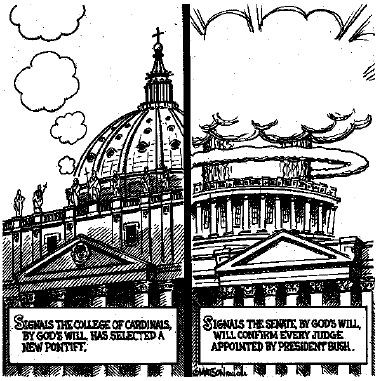Century Marks

Rinse cycle: A priest assigned to serve the Hispanic population in eastern North Carolina decided to go where the people are. He set up “shop” Sundays in a laundromat frequented by Mexicans. With a hand-woven blanket and some bread and wine on a small table, he said a short mass while customers transferred clothes from washers to driers. In time, people started to come to the mass without their dirty laundry (Richard Lischer in Interpretation, April).
Our common fears: If the world is to become more secure, world leaders need to reach a consensus about the real threats to peace and security, says Kofi Annan, secretary-general of the United Nations. Of course, people perceive threats differently: a New York banker who walks past Ground Zero everyday will have different fears from a 12-year-old Malawian who lost both parents to AIDS. People also need to see how interconnected real threats are and how they feed off each other. A major attack on a financial center in the U.S. would sink sub-Saharan Africans into even deeper poverty; conversely, millions of Americans could be affected if a new and deadly disease were to break out in a country with poor health (Foreign Affairs, May/June).
Peaceful pope: While many progressive Catholics are wary of the new pope because of his reputation as an enforcer of tradition, the Catholic Peace Fellowship is encouraged by this appointment. As a cardinal, Pope Benedict XVI was a strong opponent of the U.S.-led invasion of Iraq. In 2003 he even questioned whether it was still possible to talk of a “just war,” given that modern weaponry makes “possible destructions that go beyond combatant groups.” The pope does not believe that politics can be conducted without reference to the gospel or that the hard admonitions of Jesus to “love your enemies,” “turn the other cheek” and “put away the sword” should be dismissed as impractical. The CPF points out that the young Ratzinger made a decision for peace that could have cost him his life: he deserted his post in the German army during World War II (www.catholicpeacefellowship.org).
Pull the plug: A talk-radio host in Pittsburgh was dismissed from his position after a week in which callers discussed whether Pope John Paul II could get into heaven because of his Catholic beliefs. The host, Marty Minto, pastor of a community church, said he was doing what he always did—discuss current events from a “biblical perspective” (Pittsburgh Tribune-Review, April 1).
Living on fumes: James Howard Kunstler notes that the International Auto Show took place in New York at the same time the price of crude oil jumped to over $55 a barrel. Other than displaying some hybrid cars, the auto show conveyed little awareness of the fact that the era of cheap oil is over. The U.S. has just 28 billion barrels of crude oil reserves under the ground—not counting the government’s strategic petroleum reserves, which are just a tiny fraction of the total. Since Americans use 20 million barrels of oil a day, or 7 billion barrels a year, total American reserves would last only four years at most if imports were cut off (www.oriononline.org).
Crank case: The province of Ontario makes more cars than the state of Michigan. And most of these Canadian-made cars are manufactured by America’s big three automakers: GM, Ford and Daimler-Chrysler. The reason: Canada’s national health care system. An American worker costs auto manufacturers $6,500 per year for health care, but in Canada, which has a government-run and -funded program, the cost is just $800 (Newsweek, April 18).





